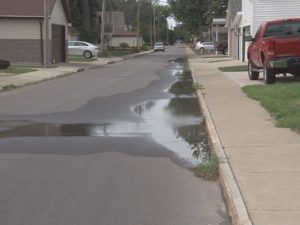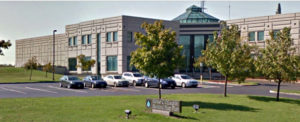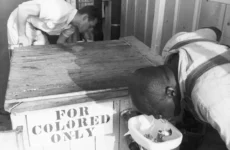Council Candidate Pascoal proposes solutions to vexing problem
According to the recently published Niagara Falls Water Board’s Annual Drinking Water Quality Report, “The total water produced in 2015 was over 7.7 billion gallons… The annual amount of water delivered to customers was about 2.5 billion gallons. This leaves about 5.2 billion gallons unaccounted for.”
You’d think that with this kind of obscene wastage – for every three gallons of processed water, more than two go unaccounted for – lost mostly through underground leaks, the Water Board would refrain from or at the very least be somewhat red-faced about sticking it to Niagara Falls water consumers.
Think again, because it was reported last week that a $300 water bill from 2013 for Columbus Square Park on Pine Avenue in the Falls has blown up into a $3000 liability which the Water Board intends to collect on by foreclosing on the small community gathering place. Since past due amounts are rolled into the property tax bill every November, there’s no going back and the amount cannot be forgiven.
The Water Board’s rapacious billing practices also impact Niagara Falls residents and landlords in sometimes extreme and unpredictable ways.
The facts of life, as everybody knows, are that water bills here are often as high as tenants are unreliable. To leave the responsibility of paying the water bill to the tenant is to lead a perilous existence, since unpaid water bills ultimately attach to the property owner. Good luck finding a former tenant who leaves behind months of water bills, let alone suing them.
Therefore, the majority of landlords who rent properties in Niagara Falls simply include water in the rent.
Which sets off the Law of Unintended Consequences – since it makes no difference to the tenant, paying a fixed rent, whether they use water reasonably or use it in amounts that rival that which goes over the falls, there’s no incentive to inform the landlord of a running toilet or leaky faucet, or any other situation which causes water usage to increase precipitously.
That’s what happened to a Niagara Falls landlord who forwarded a copy of a September water bill to the Reporter for analysis.
Covering the billing period from 5/5 through 8/3, the amount due was an appalling $1989.10 for one rental.
In this case, the tenant happened to inform the landlord of the defective running toilet in early July. Otherwise, the bill would have topped $2000.
“I thought, oh brother,” the landlord told us on the phone, “the terror of the next water bill… we were over there like a flash.” In fact, the next day. But not in time to head off the Water Board’s windfall.
When we asked the landlord if they intended to appeal, the response was, “And fight them? You’ve got to be kidding.”
As it says on the bill, “Complaints of overcharge on water bills must be made on or before the 16th day of the month in which such bills are rendered and all water bills against which no claim has been made within such time set forth above shall be considered correct and must be paid…”
It therefore behooves one to structure one’s life, including scheduling of vacations, around looking for this bill in the mail, given the brief time window for complaints. Not to mention hoping the Post Office doesn’t exceed its 7-10 day expectation of delivery.

One of hundreds of leaks that former Water Board director Paul Drof contended lurk below the streets and sidewalks of Niagara Falls erupts to the surface last year on West Rivershore Drive.
That’s just the beginning, however. A lengthy writ on the Water Board’s website informs us that, “WHEREAS, the Niagara Falls Water Board (“NFWB”) receives claims from customers challenging high water and or sewer bills… (and) WHEREAS, it is within the sole discretion of the NFWB to charge and collect penalties and interest… (and) WHEREAS, claims for overcharge that are supported by sufficient facts may warrant consideration by the NFWB…”
NOW THEREFORE BE IT RESOLVED (that) Users(‘ bills) must be at least 2.5 times higher than the average actual bill over the past year to qualify… (all other) Customer accounts must be current… Claims are limited to one every two (2) years… Adjustments for both water and sewer, combined, may not exceed $1,000.00 per claim, without Board resolution and approval (which would apply to even the modest bill discussed above)… All claims based upon leaks must be repaired within 1 – 2 weeks of initial discovery by the claimant/customer (so keep close tabs on your property while you’re vacationing in Costa del Sol).
“The Water Board gives you two weeks to challenge the bill for things just like this. I feel that time period should be extended,” stated City Council candidate Robert Pascoal, “and they should make it prominent on the bill.”
“Do amounts and circumstances like that which we describe above, the $1989.10 surprise, ever lead to forgiveness of some or all of the balance, to your knowledge?” we asked Mr. Pascoal.
“Yes. Forgiveness has been granted. But they (the Water Board) can be tough. It isn’t the first time this has happened and it can be devastating to a person’s budget.
“The LAGN (Landlords’ Association of Greater Niagara) looked into a monitoring system that anyone could subscribe to utilizing the wireless meters that are in use today. The monitoring of these meters at say weekly intervals could point to anomalies in waster usage and alert the landlord/consumer to a problem well in advance of the quarterly read,” he added.
“I’m a problem solver. I learn about a problem. I investigate it,” said Mr. Pascoal. “I reach out to people with experience. A monitoring system is one thing that could have a major impact on people’s lives.”























